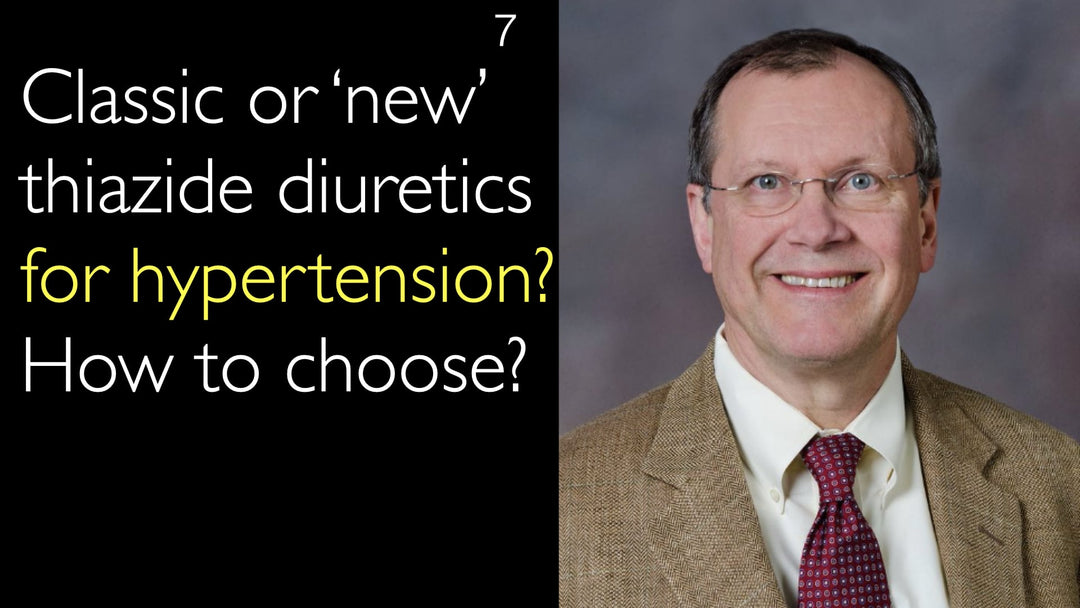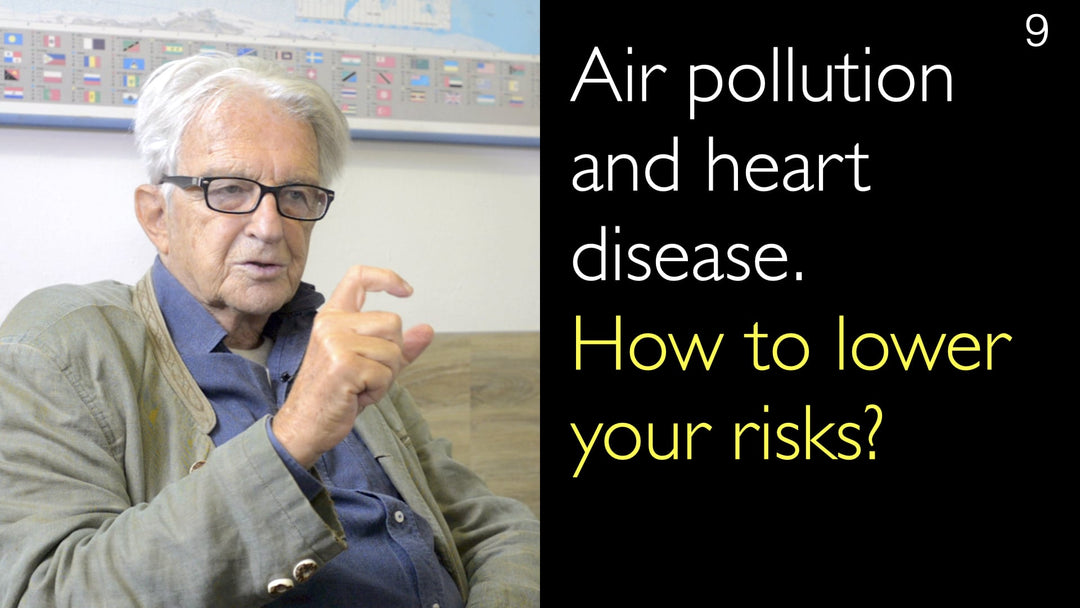Leading expert in hypertension and nephrology, Dr. David Ellison, MD, explains how to choose between classic and newer thiazide diuretics for high blood pressure treatment. He discusses the ongoing debate between hydrochlorothiazide and chlorthalidone, referencing major clinical trials like HYVET. Dr. Ellison details his clinical approach to managing side effects like hypokalemia and orthostatic hypotension in elderly patients.
Choosing the Right Thiazide Diuretic for Hypertension Treatment
Jump To Section
- Thiazide Diuretics Comparison
- Clinical Evidence in Hypertension
- Geographic Prescribing Patterns
- Managing Diuretic Side Effects
- Elderly Hypertension Treatment
- Future Research Directions
- Full Transcript
Thiazide Diuretics Comparison
Dr. David Ellison, MD, explains the key differences between classic and newer thiazide diuretics for hypertension management. He notes that hydrochlorothiazide represents the classic thiazide diuretic, while chlorthalidone and indapamide are considered newer thiazide-like diuretics. Dr. David Ellison, MD, states that direct comparison studies between these medications are limited, creating ongoing debate among hypertension specialists about which drug provides superior blood pressure control with fewer side effects.
Clinical Evidence in Hypertension
Dr. David Ellison, MD, discusses the clinical trial evidence supporting different thiazide diuretics. He references the HYVET trial (Hypertension in the Very Elderly Trial) which demonstrated that indapamide effectively reduced stroke risk and other adverse cardiovascular events. Dr. David Ellison, MD, also mentions that chlorthalidone has shown effectiveness in major hypertension studies. Dr. David Ellison, MD, emphasizes that while circumstantial evidence suggests chlorthalidone might be more effective than hydrochlorothiazide, definitive randomized controlled trials comparing these medications directly are still needed.
Geographic Prescribing Patterns
Dr. David Ellison, MD, highlights interesting geographic variations in thiazide diuretic prescribing practices. In the United States, physicians typically choose between hydrochlorothiazide and chlorthalidone, with chlorthalidone often preferred as the long-acting option. Conversely, European countries more commonly prescribe indapamide for hypertension treatment. Dr. David Ellison, MD, notes that these regional preferences have developed without clear evidence establishing superiority of one medication over another, reflecting practice patterns rather than evidence-based differences.
Managing Diuretic Side Effects
Dr. David Ellison, MD, shares his clinical approach to managing thiazide diuretic side effects, particularly hypokalemia (low potassium levels). He recommends implementing a high-potassium diet for patients taking thiazide diuretics to prevent potassium depletion. If dietary measures prove insufficient, Dr. Ellison suggests adding potassium-sparing diuretics like spironolactone or triamterene to the treatment regimen. This proactive management strategy helps maintain electrolyte balance while achieving blood pressure control.
Elderly Hypertension Treatment
Dr. David Ellison, MD, addresses specific considerations for treating hypertension in elderly patients with thiazide diuretics. He notes that orthostatic hypotension (blood pressure drop upon standing) represents a particular concern in this population. However, clinical evidence indicates that thiazide diuretics do not cause more syncope (fainting) than other antihypertensive drug classes. Dr. David Ellison, MD, emphasizes that elderly patients clearly benefit from thiazide diuretic therapy when appropriately managed, despite these potential side effect concerns.
Future Research Directions
Dr. David Ellison, MD, discusses ongoing research that may finally resolve the thiazide diuretic debate. He mentions a Veterans Affairs-sponsored randomized controlled trial currently underway that aims to provide definitive evidence comparing different diuretic classes. Dr. Anton Titov, MD and Dr. Ellison both express interest in these results, which could establish clear guidelines for thiazide diuretic selection in hypertension treatment. This research represents a crucial step toward evidence-based decision making in antihypertensive therapy.
Full Transcript
Dr. Anton Titov, MD: How to compare classic thiazide diuretics such as hydrochlorothiazide with newer thiazide-like diuretics, for example, chlorthalidone, indapamide, metolazone for the treatment of hypertension? Especially in elderly patients, there have been some pivotal clinical trials in that regard.
Dr. David Ellison, MD: I think that we don't really have very good randomized trials, randomized controlled trials, which are considered the gold standard, comparing different classes of diuretics. There's a lot of circumstantial evidence that chlorthalidone is more effective as an antihypertensive drug than hydrochlorothiazide. But I would say that's very circumstantial.
Some studies have suggested that chlorthalidone may actually have excess side effects and have complications to it. So there continues to be this debate about which class of diuretic drug is better.
I must say, in the United States, we typically use chlorthalidone as our long-acting thiazides. In Europe, they use indapamide more. I frankly have never used indapamide. That's a funny, geographically specific behavior pattern, but mostly for us in the United States, it's either hydrochlorothiazide or chlorthalidone.
There is a randomized controlled trial going on, sponsored by the VA, which is intended to actually answer that question in a definitive way. I'm very anxious to see those results. Many of us have believed that chlorthalidone was a good drug, but then people have again raised this worry about using chlorthalidone. So I think we'd like to settle that once and for all.
You mentioned hypertension in the elderly. Many big trials were done. CHEP trial tested chlorthalidone. HYVET trial tested indapamide. HYVET is Hypertension Treatment in the Very Elderly. It showed that chlorthalidone and indapamide effectively reduced the risk of strokes and other adverse effects.
There really is probably not a concern of using chlorthalidone. My own belief, my own practice pattern is that those drugs are great, but I do like to avoid people getting hypokalemia. I use chlorthalidone, but I try to avoid hypokalemia by ensuring they're on a high potassium diet.
And then, if need be, adding a potassium-sparing diuretic like spironolactone or triamterene. Conversely, if there's another indication like kidney disease, we would typically start with an ACE inhibitor or angiotensin receptor blocker. But I'm not afraid to use a thiazide-type diuretic, typically chlorthalidone, in my elderly patients.
I think there's clear evidence that the elderly benefit from that class of drugs. So I don't see them as being very different from others.
Obviously, the concern in the elderly is often orthostatic hypotension. In the clinic yesterday, we were talking about an elderly patient who had that problem. That's a tough problem. And there, I tend to worry about the vasodilating drugs.
But again, the data from the use of thiazides is that they don't tend to be more likely to cause syncope than other classes of drugs. And so, I don't avoid them in those patients.
Dr. Anton Titov, MD: I did mean exactly the HYVET clinical trial, the hypertension in the very elderly, where I believe indapamide was tested. And indeed, it's used extensively in Europe and in Israel.
Dr. David Ellison, MD: Yeah, and I started, I said chlorthalidone, but that was probably indapamide. I look at indapamide and chlorthalidone as pretty interchangeable. But I don't think they've ever been compared directly head-to-head. So that's an interesting thought.
And I don't think that any of our formularies carry indapamide in this country. We just don't have that choice. And I tend not to think of that.







